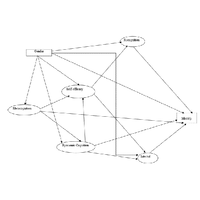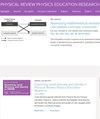物理中的元认知和认识认知通过物理自我效能感的中介与物理认同相关联
IF 3.6
2区 教育学
Q1 EDUCATION & EDUCATIONAL RESEARCH
Physical Review Physics Education Research
Pub Date : 2024-04-26
DOI:10.1103/physrevphyseducres.20.010130
引用次数: 0
摘要
本研究旨在(i)调查物理认识论认知和元认知,以及物理认同框架的三个维度--认知、物理自我效能感和兴趣--如何预测土耳其高中生的整体物理认同,以及(ii)调查研究建构中的性别差异。共有 1197 名高中生参与了这项研究。收集到的数据采用结构方程模型进行分析。分析结果表明,模型很好地拟合了数据,进一步推动了干预研究,以检验模型中提出的因果关系。结果表明,认知和兴趣直接预测物理认同,并在物理自我效能感与物理认同的关系中起中介作用。元认知和认识认知通过物理自我效能感预测物理认同。研究还观察到元认知、认识认知、自我效能感、认知和兴趣之间存在着显著的直接和间接关系。此外,本研究还发现了性别差异。虽然在物理元认知和认识认知方面没有观察到性别差异,但男生在物理认同感、自我效能感、认可度和兴趣方面的得分高于女生。然而,中介分析进一步表明,物理自我效能感的性别差异可以解释物理认同、认知和兴趣的性别差异。本研究的结果可以激励未来的干预措施,测试元认知和认识活动对物理自我效能感和认同感的影响,还可以激励未来的干预措施,测试减少物理自我效能感性别差异的做法是否有助于消除物理认同感、认可度和兴趣方面的性别差异。本文章由计算机程序翻译,如有差异,请以英文原文为准。

Metacognition and epistemic cognition in physics are related to physics identity through the mediation of physics self-efficacy
This study aimed (i) to investigate how epistemic cognition in physics and metacognition, together with three dimensions of physics identity framework—recognition, physics self-efficacy, and interest—predicted the overall physics identity of Turkish high school students and also (ii) to investigate gender differences in study constructs. A sample of 1197 high school students participated in the study. The collected data were analyzed using structural equation modeling. The analysis results indicated that the model fitted the data well, further motivating intervention studies to test the causal relations proposed in the model. The results showed that recognition and interest directly predicted physics identity and mediated the relation of physics self-efficacy to it. Metacognition and epistemic cognition predicted physics identity through physics self-efficacy. The study also observed significant direct and indirect relations among metacognition, epistemic cognition, self-efficacy, recognition, and interest. Furthermore, gender differences were found in the current study. While no gender difference was observed in metacognition and epistemic cognition in physics, male students scored higher than female students in physics identity, self-efficacy, recognition, and interest. However, the mediation analysis further indicated that gender differences in physics self-efficacy might explain gender differences in physics identity, recognition, and interest. The results of this study could motivate future interventions testing the effect of metacognitive and epistemic activities on both physics self-efficacy and identity, and also, the interventions testing whether practices that reduce the gender gap in physics self-efficacy will help eliminate the gender gap in physics identity, recognition, and interest.
求助全文
通过发布文献求助,成功后即可免费获取论文全文。
去求助
来源期刊

Physical Review Physics Education Research
Social Sciences-Education
CiteScore
5.70
自引率
41.90%
发文量
84
审稿时长
32 weeks
期刊介绍:
PRPER covers all educational levels, from elementary through graduate education. All topics in experimental and theoretical physics education research are accepted, including, but not limited to:
Educational policy
Instructional strategies, and materials development
Research methodology
Epistemology, attitudes, and beliefs
Learning environment
Scientific reasoning and problem solving
Diversity and inclusion
Learning theory
Student participation
Faculty and teacher professional development
 求助内容:
求助内容: 应助结果提醒方式:
应助结果提醒方式:


